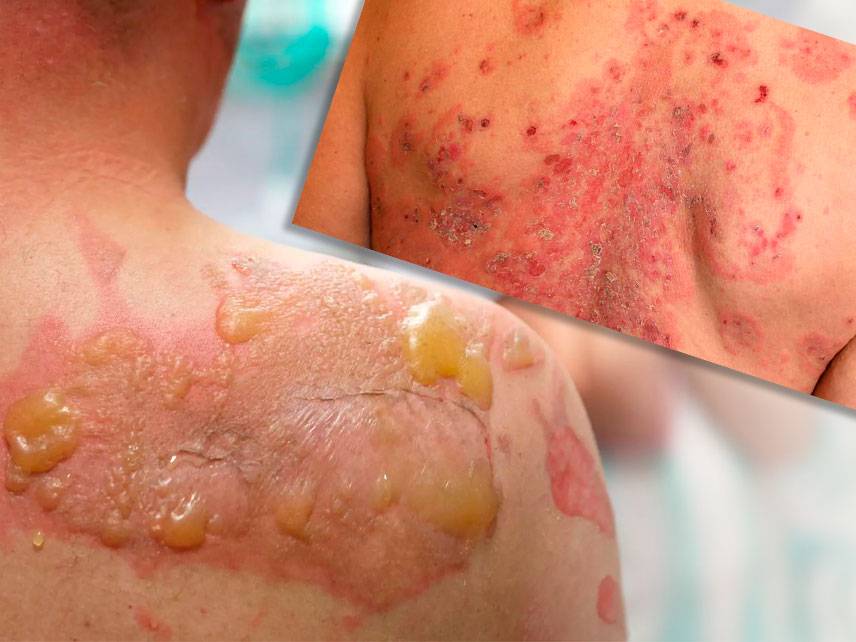Pemphigus is a rare autoimmune disorder that affects the skin and mucous membranes. It’s characterized by blisters that form on the skin, mucous membranes, and other areas of the body. The blisters form as a result of a breakdown in the cells that help hold the top layers of skin together, leading to increased fragility of the skin. Understanding the signs and symptoms of pemphigus can help you recognize the disorder and get appropriate treatment.
Signs and Symptoms
The signs and symptoms of pemphigus can vary greatly, depending on the type of pemphigus.
The most common symptoms of pemphigus include:
-
Blisters on the skin that are often red and painful
-
Blisters in the mouth that can cause pain and difficulty eating
-
The skin may become dry and scaly
-
Itching and burning of the skin
-
The blisters may become infected
Causes
The exact cause of pemphigus is unknown, but it is believed to be an autoimmune disorder. An autoimmune disorder occurs when the body’s immune system mistakenly attacks healthy cells, tissues, and organs. In the case of pemphigus, the immune system attacks the cells that help hold the top layers of skin together, leading to the formation of blisters.
Risk Factors
Anyone can develop pemphigus, but there are certain factors that may increase your risk of developing the disorder.
These risk factors include:
-
Age: Pemphigus is most commonly diagnosed in people over the age of 40.
-
Gender: Pemphigus is more commonly diagnosed in women than in men.
-
Genetics: Having a family history of pemphigus may increase your risk of developing the disorder.
-
Ethnicity: People of Ashkenazi Jewish descent are more likely to develop pemphigus than other ethnicities.
Prevention
There is no sure way to prevent pemphigus, but there are steps you can take to reduce your risk.
Prevention pemphigus include:
-
Avoiding triggers: Identifying and avoiding triggers, such as stress, may help reduce your risk of developing pemphigus.
-
Managing stress: Practice relaxation techniques, such as yoga or meditation, to help manage stress.
-
Eating a healthy diet: Eating a healthy and balanced diet may help reduce your risk of developing pemphigus.
Diagnosis
If you suspect you or someone you know may have pemphigus, it’s important to see a doctor right away. A doctor can perform a physical examination and ask questions about your medical history to help diagnose pemphigus. Your doctor may also order blood tests and skin biopsies to confirm the diagnosis.
Treatment
Treatment for pemphigus depends on the severity of the condition.
Treatment for pemphigus may include:
-
Topical medications: Creams and ointments applied directly to the affected area.
-
Oral medications: Medications taken orally, such as corticosteroids, to reduce inflammation and suppress the immune system.
-
Immunosuppressive medications: Medications that suppress the immune system and reduce the risk of blisters.
Coping and Support
Living with pemphigus can be difficult, but there are ways to cope. It’s important to find a support system, whether that’s friends, family, or a support group. It’s also important to practice self-care and take time for yourself.
Complications
If left untreated, pemphigus can lead to serious complications.
Complication pemphigus may include:
-
Infection: The blisters can become infected if not treated properly.
-
Scarring: The blisters can cause scarring if they heal improperly.
-
Organ damage: The immune system’s attack on the skin can lead to organ damage.
Living with Pemphigus
Living with pemphigus can be challenging, but it’s important to remember that you’re not alone. Finding a support system and practicing self-care can help you manage the condition. It’s also important to follow your doctor’s instructions and take your medications as prescribed. With proper treatment and lifestyle changes, you can manage your pemphigus and live a healthy and fulfilling life.
Pemphigus is a rare autoimmune disorder that affects the skin and mucous membranes. It’s characterized by blisters that form on the skin, mucous membranes, and other areas of the body. The exact cause of pemphigus is unknown, but it is believed to be an autoimmune disorder. Understanding the signs and symptoms of pemphigus can help you recognize the disorder and get appropriate treatment. Treatment for pemphigus depends on the severity of the condition and may include topical medications, oral medications, and immunosuppressive medications. Living with pemphigus can be challenging, but it’s important to remember that you’re not alone. With proper treatment and lifestyle changes, you can manage your pemphigus and live a healthy and fulfilling life.





